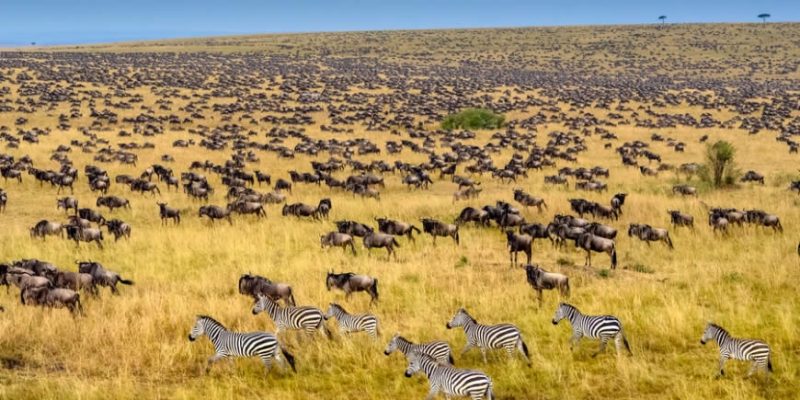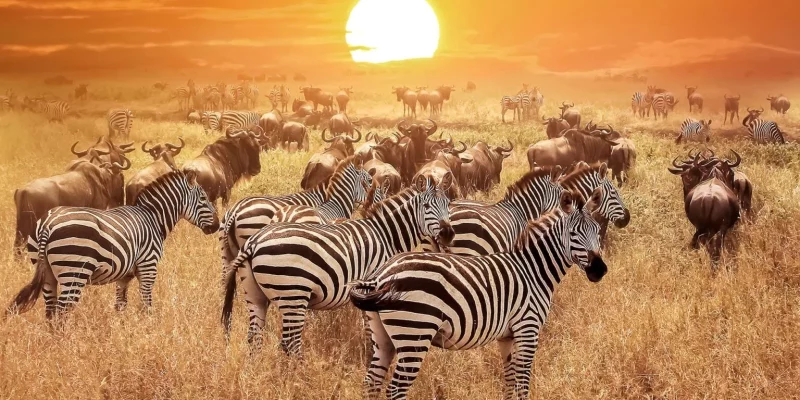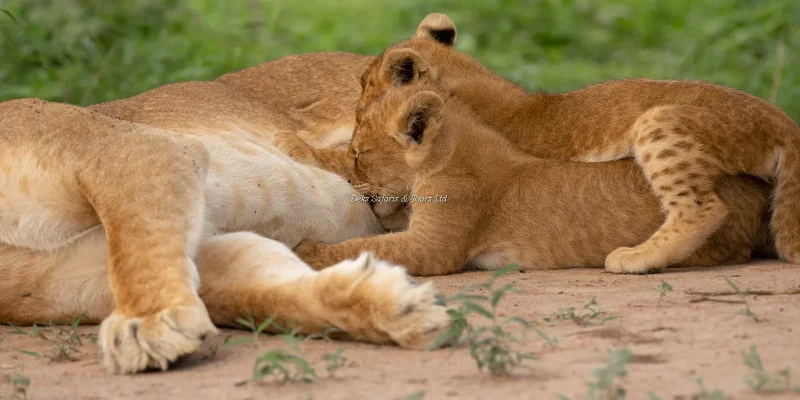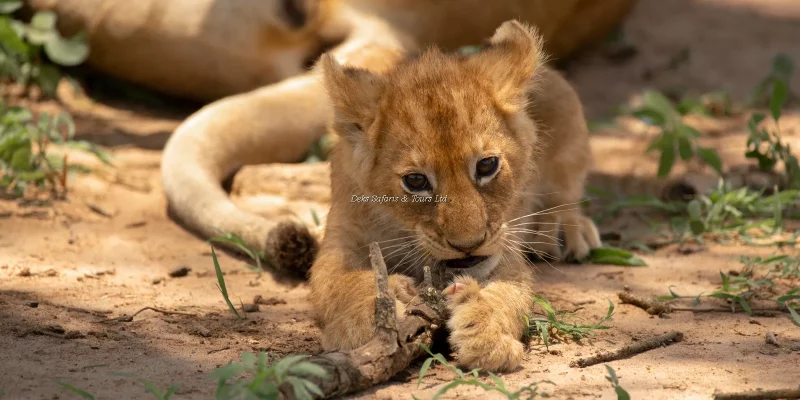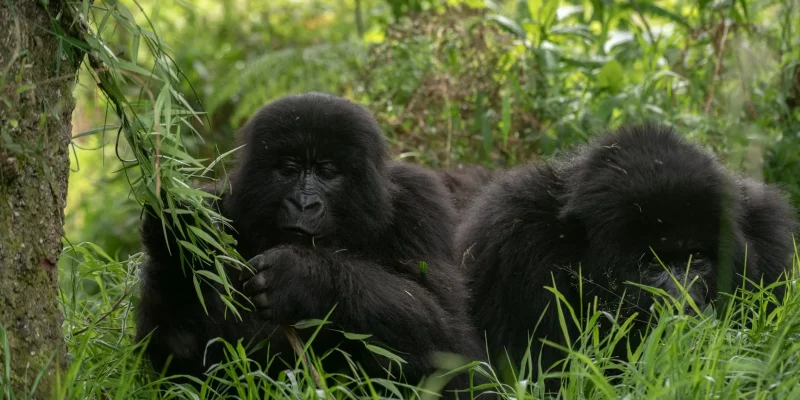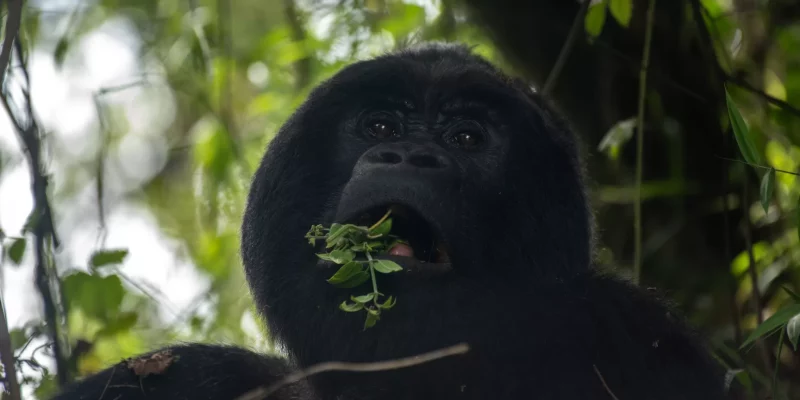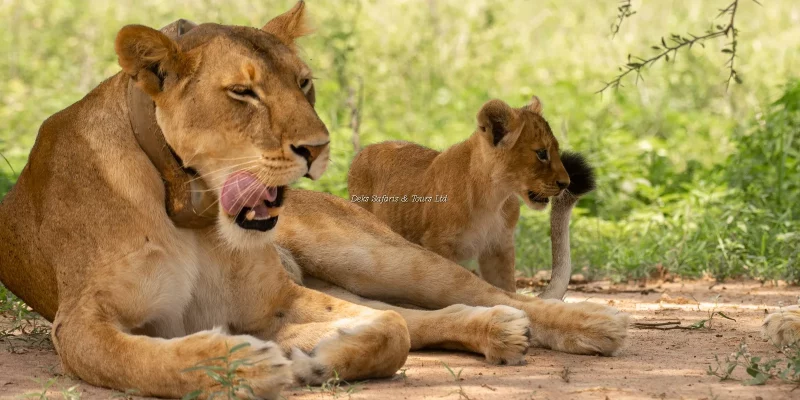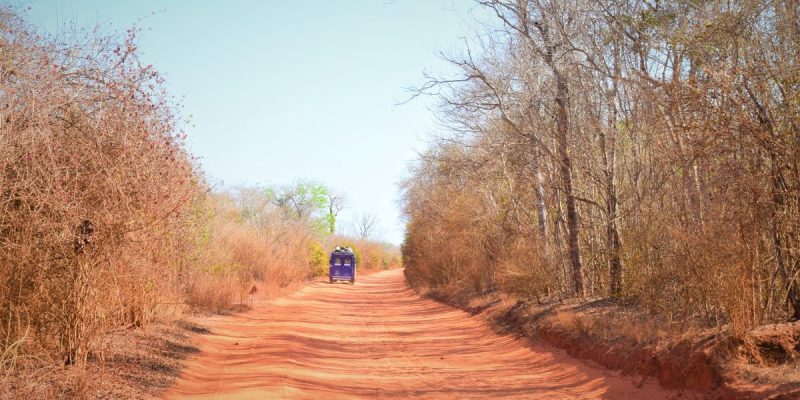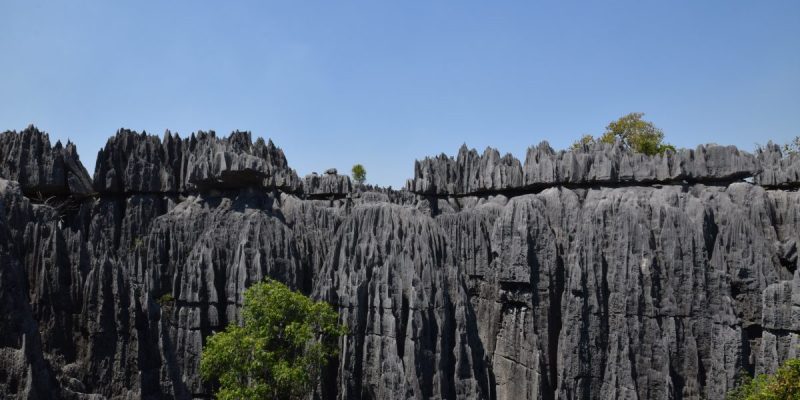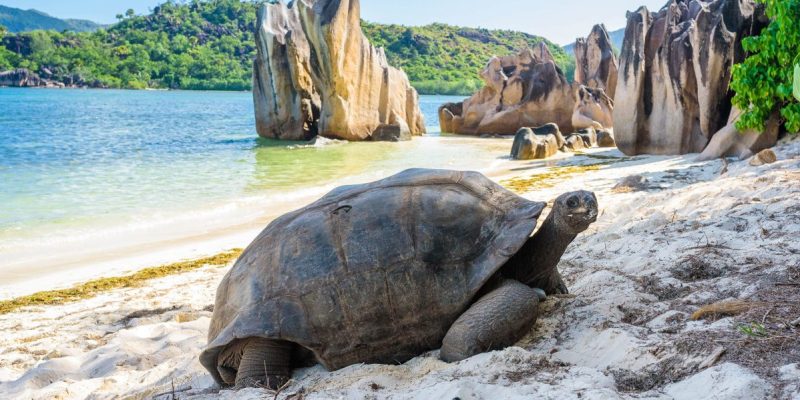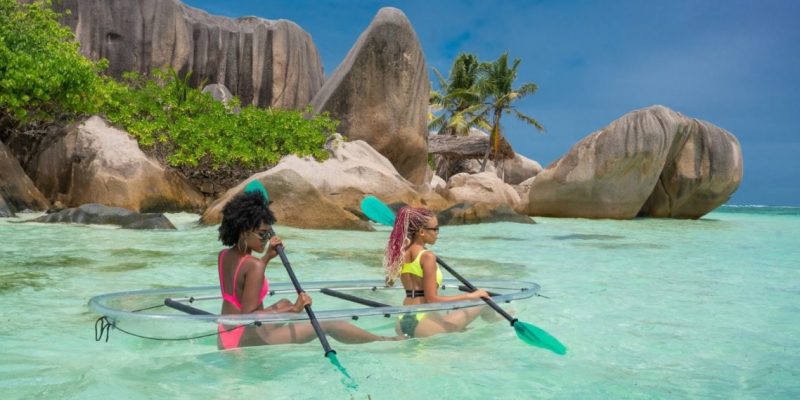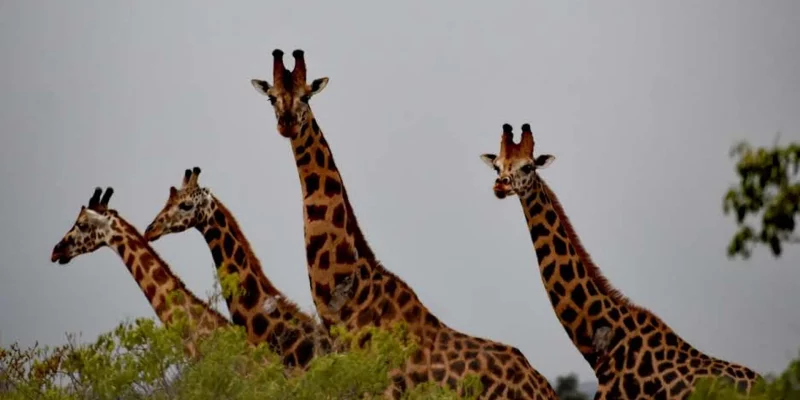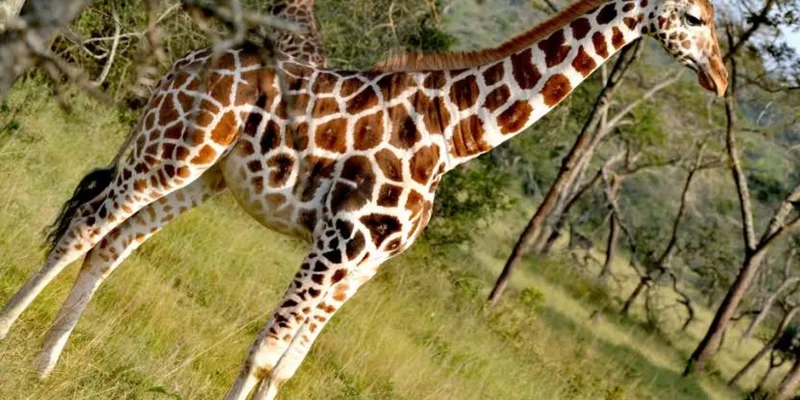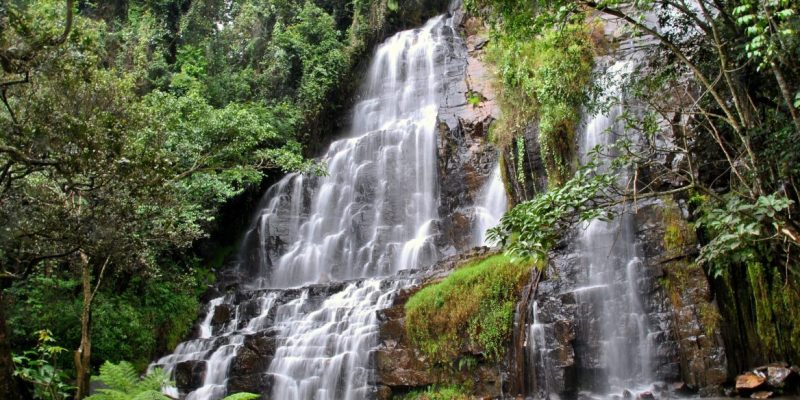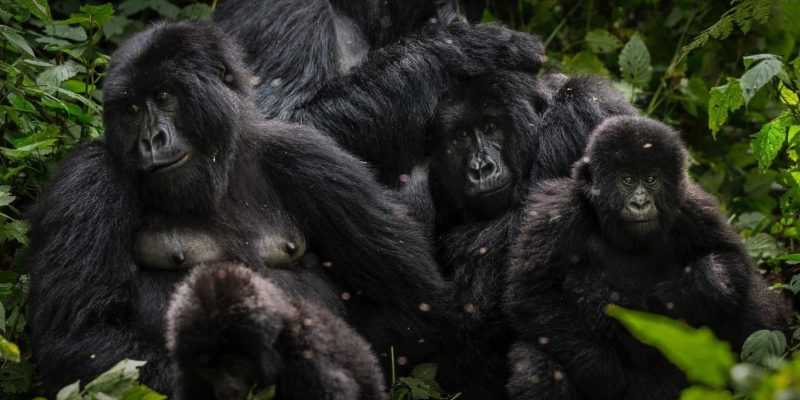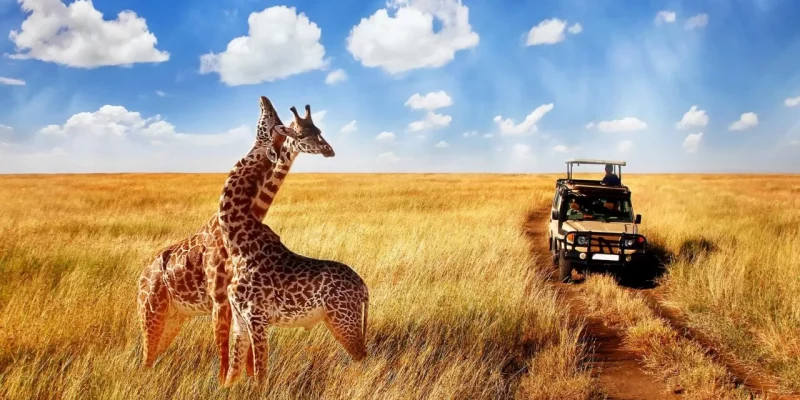What to Pack for African Safari – A Detailed Comprehensive African Safari Packing List Guide
Exciting news – you’re embarking on African Safari! Fantastic! Samuel and Jane are big fans of African Safaris and have had the privilege of enjoying numerous adventures together. Now, you might be pondering over what exactly to pack for your African Safari.
Fret not, as we’re here to lend a hand. Having embarked on several African Safaris across a range of countries including Kenya, Tanzania, Uganda, Rwanda, Zanzibar, Seychelles, Burundi, Madagascar, and Congo, we’ve gained invaluable insights into the essentials for your African Safari packing list, as well as items you can probably do without. Furthermore, we’ll offer some packing considerations and furnish you with a detailed checklist tailored specifically for your African Safari journey.
Over 100 African Safari & Tour Packages
5 Days Masai Mara Kenya Safari
5 Days Masai Mara Kenya Safaris Tour Wildlife Adventure to Masai Mara National Reserve, Lake Nakuru National Park, and Naivasha Budget Medium and Luxury Safari in Kenya.
7 Days Best Kenya Safari Tour
7 Days Best Kenya Safaris Tour four beautiful parks in Kenya. Located at the foot of Mount Kilimanjaro, Africa’s highest peak at 5,895 meters, Amboseli National Park.
8 Days Tanzania Safari Adventure
An iconic 8-day Tanzania safari adventure where you will not only have the opportunity to visit all the parks on the northern Tanzanian safari circuit (including 3 nights.
8 Days Tanzania Safari Tour
Our 8 Days Tanzania Safari, Nature & Culture Tour provides the most comprehensive overview of the country’s parks and culture. You will visit all four of Tanzania’s famous.
7 Days 1 Week Uganda Safari
These 7 Days 1 Week Uganda Safari – Wildlife Safari & Gorilla Trek in Uganda will take you through the pearl of Africa – exclusive Uganda and experience an abundance.
7 Days Best of Uganda Tour
This is another fun 7 days tour to the best of Uganda. Take Uganda’s best 7-day Best Uganda tour to the world’s thundering waterfall and find the nearest great ape, the chimpanzee.
7 Days Rwanda Uganda Tour
7 Days Rwanda Uganda Tour for Ultimate Gorilla Trekking, Golden Monkey Tracking, and Wildlife Adventure Safari. You’ll arrive at Kigali Airport and transfer to your accommodation.
7 Days Uganda Rwanda Safari
This 7-day Uganda Rwanda Gorilla Safari takes you through the Pearl of Africa – Uganda and the Land of a Thousand Mountains – Rwanda to see abundant wildlife including .
8 Days Madagascar Tour
8 Days Madagascar Safari Tour Trekking in the Ridges and Canyons of Isalo. Madagascar is “Red Island – Ile rouge” the abundant diversity with a unique nature.
9 Days Madagascar Unique Safari
Embark on a mesmerizing 9 Days Madagascar Unique Safari odyssey from Antananarivo to Tulear, immersing yourself in the diverse landscapes and natural.
8 Days Seychelles Safari
It’s quite a 8 Days Seychelles Safari journey to get to Cosmoledo Atoll, in the furthest reaches of the Seychelles Outer Islands, but it’s very well worth it for the adventurous souls that spread their wings this far.
8 Days Seychelles Tour
For travelers looking for a fantastic tropical island holiday, we have crafted the 8 Days Seychelles Tour to the idyllic island getaway. Enjoy warm tropical weather, great accommodations, wonderful food and awesome.
7 Days Rwanda Congo Safari
Gorilla Tracking is one of Africa’s greatest wildlife encounters & considered a unique 7 Days Rwanda Congo Safari adventure. It offers both magically beautiful & soul changing encounters with these incredible.
8 Days Rwanda Congo Gorilla Safari
Enjoy the 8 Days Rwanda Congo Gorilla Trekking and Wildlife Safari. One of Africa’s best animal experiences is gorilla tracking which is regarded as a unique experience. It offers interactions with these amazing.
7 Days Best of Burundi Safari
The 7 Days Best of Burundi Safari promises an immersive journey through diverse and captivating landscapes, offering an array of enriching experiences that will leave an indelible mark on your memories of Burundi.
11 Days Burundi Rwanda Congo
Experience the ultimate East African adventure with the 11 Days Burundi, Rwanda, Congo Safari, a carefully crafted itinerary that invites you to explore the diverse safari attractions of three captivating countries. This extraordinary…
10 Days Stone Town Zanzibar Safari
The 10 Days Stone Town Zanzibar Sand and Selous Safari Combines Stone Town, a Unesco World Heritage Site, and a beach resort on Zanzibar with 2 nights on safari in Nyerere National Park (formerly Selous) in South Tanzania.
15 Days Tanzania Zanzibar Beach Safari
You will have 15 Days Tanzania Zanzibar Exciting Safari with the aid of this itinerary, seeing all that the nation has to offer—from the breathtaking Serengeti, Tarangire, and Ngorongoro Crater to the unexplored beaches of Zanzibar.
What to Consider when Packing for African Safari?
When preparing for an African safari, there are several important considerations to keep in mind to ensure a safe, comfortable, and enjoyable experience. First and foremost, clothing choices are crucial. Lightweight, neutral-colored clothing that blends with the surroundings is recommended to help you stay cool and avoid attracting unwanted attention from wildlife. Opt for breathable fabrics such as cotton or moisture-wicking materials to cope with the hot climate. Additionally, pack long-sleeved shirts and pants to protect against insects and the sun’s harsh rays. Don’t forget to bring a wide-brimmed hat, sunglasses, and sturdy, comfortable walking shoes or boots suitable for outdoor activities and uneven terrain.
Another essential aspect to consider is health and safety. Before traveling, consult with your healthcare provider or a travel medicine specialist to discuss necessary vaccinations and medications for malaria prevention. Ensure you have an adequate supply of any prescription medications you require, along with a basic first-aid kit containing essentials such as insect repellent, sunscreen, antidiarrheal medication, and bandages. It’s also wise to pack a water purification system or water purification tablets to ensure access to safe drinking water throughout your journey, as potable water may not always be readily available in remote safari locations.
Lastly, when packing for an African safari, don’t forget about photography and wildlife viewing essentials. Bring a good quality camera with extra batteries, memory cards, and lens cleaning supplies to capture stunning images of the diverse wildlife and breathtaking landscapes you’ll encounter. Binoculars are also indispensable for observing distant animals and bird species in their natural habitats. Additionally, pack a small backpack or daypack to carry essentials such as water, snacks, and personal items during game drives and walking safaris. By considering these key factors and packing thoughtfully, you’ll be well-prepared to embark on an unforgettable African safari adventure.
Where are you going for African Safari?
If you’re considering going on an African safari, there are numerous incredible destinations to choose from, including Kenya, Tanzania, South Africa, Botswana, Zambia, and many more, each offering unique wildlife experiences and stunning landscapes. Depending on your preferences and interests, you can select a safari destination known for its diverse wildlife, vast savannahs, lush forests, or picturesque waterways. Whether you’re dreaming of witnessing the Great Migration in the Serengeti, tracking gorillas in Uganda’s Bwindi Impenetrable Forest, or exploring the Okavango Delta in Botswana, Africa offers an array of safari experiences to suit every traveler’s taste.
What will the weather be like during your African Safari?
The weather during your African safari can vary significantly depending on the specific region and time of year you choose to visit. Generally, most safari destinations experience distinct wet and dry seasons, with variations in temperature and precipitation. For example, East African countries like Kenya and Tanzania typically have two rainy seasons: the long rains from March to May and the short rains from October to December. During these periods, you can expect occasional showers and lush green landscapes, making it an excellent time for bird watching and witnessing the Great Migration. However, the wet season can also mean thicker vegetation, making wildlife spotting a bit more challenging. In contrast, the dry seasons, typically from June to September and January to February, offer drier weather and clearer skies, making wildlife easier to spot around water sources as vegetation thins out. These periods are ideal for game viewing and photography, with animals gathering around rivers and watering holes.
The wet season, from November to April, brings relief from the heat but also occasional heavy rains, transforming landscapes into lush green paradises and attracting migratory birds. While game viewing can be more challenging due to dense vegetation and flooded areas, it’s an excellent time for bird watching and enjoying discounted rates at lodges during the “green season.” Overall, understanding the weather patterns of your chosen safari destination can help you plan and make the most of your African safari experience.
How long is your African Safari?
The duration of your African safari can vary depending on various factors, including your preferences, budget, and available time. Safari experiences range from short excursions lasting a few days to immersive adventures spanning several weeks. For those with limited time, there are numerous options for shorter safaris, typically lasting between 3 to 7 days, which offer a taste of the African wilderness and the opportunity to see iconic wildlife such as lions, elephants, and giraffes. These shorter safaris often focus on specific national parks or game reserves, allowing visitors to maximize their time and wildlife sightings within a condensed timeframe.
On the other hand, for travelers seeking a more comprehensive exploration of Africa’s diverse ecosystems and wildlife, longer safari itineraries ranging from 10 days to several weeks are available. These extended safaris provide a deeper immersion into the continent’s natural wonders, with opportunities to visit multiple destinations, observe a wider range of wildlife species, and participate in diverse activities such as game drives, walking safaris, and cultural experiences. Longer safaris may also include visits to remote and lesser-known reserves, offering a more off-the-beaten-path experience and a deeper connection with nature. Whether you opt for a short safari getaway or an extended expedition, the length of your African safari ultimately depends on your personal preferences, interests, and available time.
What types of transport will you be using?
During your African safari, you’ll typically use a variety of transportation modes to navigate the diverse landscapes and reach different wildlife viewing areas. One of the most common modes of transport is the safari vehicle, specially designed for traversing rough terrain and providing optimal wildlife viewing opportunities. These vehicles, often open-sided or with pop-up roofs, accommodate small groups of travelers and are guided by experienced safari drivers or guides who navigate the parks and reserves while providing informative commentary about the flora and fauna.
In addition to safari vehicles, depending on your itinerary and destination, you may also utilize other modes of transportation such as boats or canoes for water-based safaris in regions like the Okavango Delta or Chobe River in Botswana, the Zambezi River in Zambia and Zimbabwe, or Lake Manyara in Tanzania. These water-based excursions offer unique perspectives on wildlife and habitats not accessible by land. Furthermore, some safari experiences may include walking safaris, where you’ll explore the wilderness on foot accompanied by armed guides, providing an intimate and immersive encounter with nature. Helicopter or light aircraft transfers are also utilized for accessing remote or inaccessible areas, providing aerial views of the stunning landscapes below. By utilizing a combination of these transportation modes, you’ll have the opportunity to explore a wide range of ecosystems and wildlife habitats during your African safari adventure.
What activities will you be doing on your African Safari trip?
During your African safari trip, you’ll have the opportunity to engage in a variety of activities that offer unique experiences and insights into the continent’s diverse ecosystems and wildlife. One of the primary activities is game drives, conducted in safari vehicles with experienced guides who lead you through national parks and game reserves in search of iconic African wildlife such as lions, elephants, giraffes, and rhinos. These game drives typically take place in the early morning and late afternoon when wildlife is most active, providing excellent opportunities for sightings and photography.
In addition to game drives, many safaris offer walking safaris, allowing you to explore the bush on foot accompanied by armed guides who provide fascinating insights into tracking wildlife, identifying animal tracks, and learning about the smaller flora and fauna often missed during vehicle-based safaris. Walking safaris offer a more intimate and immersive experience with nature, allowing you to appreciate the sights, sounds, and scents of the African wilderness up close.
Beyond wildlife viewing, cultural interactions and community visits are often included in safari itineraries, offering insights into the traditions, customs, and daily lives of local communities living near wildlife reserves. Additionally, activities such as hot air balloon safaris, guided nature walks, bird watching, and visits to conservation centers or research facilities enhance the safari experience, catering to a wide range of interests and preferences. Overall, the diverse array of activities available ensures that your African safari trip is filled with unforgettable moments and enriching experiences that connect you with the natural and cultural heritage of the continent.
What sort of accommodation will you be staying in during your African Safari?
During your African safari, you’ll have a variety of accommodation options to choose from, ranging from luxury lodges and tented camps to rustic bush camps and mobile camps, each offering a unique experience tailored to your preferences and budget. Luxury lodges provide the ultimate in comfort and amenities, featuring spacious suites or cottages equipped with modern conveniences such as en-suite bathrooms, air conditioning, and private verandas overlooking the wilderness. These lodges often boast elegant dining areas, swimming pools, spas, and other leisure facilities, ensuring a luxurious and indulgent safari experience.
Tented camps offer a more authentic and immersive bush experience, with spacious canvas tents furnished with comfortable beds, en-suite bathrooms with hot showers, and private verandas or viewing decks where you can relax and enjoy the sights and sounds of the bush. Some tented camps feature communal dining areas, campfire areas, and outdoor lounges, creating a cozy and convivial atmosphere for socializing with fellow travelers and sharing safari stories. For those seeking a more adventurous experience, rustic bush camps or mobile camps provide basic yet comfortable accommodations in remote and secluded locations, often without electricity or running water, allowing you to disconnect from the modern world and fully immerse yourself in nature.
General Tips when Packing for African Safari
Versatility
Versatility is key when packing for an African safari. Opt for clothing and gear that can serve multiple purposes and adapt to various situations you may encounter during your adventure. Choose lightweight, moisture-wicking clothing that can keep you cool during the day and provide warmth in cooler evenings. Items that can be layered easily allow you to adjust to changing temperatures throughout the day.
Pack versatile footwear that can handle both rugged terrain and casual activities. Sturdy walking shoes or boots are essential for bushwalks and game drives, while comfortable sandals or sneakers can be worn around camp or during leisure time. Look for footwear that offers support and protection while still being suitable for different environments.
When selecting accessories, prioritize items that offer versatility and functionality. A multipurpose scarf or buff can serve as a head covering, sun protection, or makeshift towel. A lightweight, packable rain jacket can double as a windbreaker and provide protection from unexpected showers. Similarly, a convertible backpack that can be used as both a daypack and a carry-on during travel adds versatility to your packing list.
By choosing versatile clothing, footwear, and accessories, you can streamline your packing and ensure you’re prepared for whatever your African safari adventure may bring. Versatility allows you to adapt to changing conditions seamlessly and make the most of your safari experience without being weighed down by unnecessary gear.
Shirts for African Safari
When packing shirts for an African safari, prioritize lightweight, breathable fabrics in neutral colors such as khaki, tan, or olive green to blend with the environment and minimize visibility to wildlife. Opt for long-sleeved performance shirts made from quick-drying, moisture-wicking materials to keep you cool and protected from the sun and insects during outdoor activities. Consider convertible shirts with roll-up or zip-off sleeves for added versatility, allowing you to adapt to changing weather conditions seamlessly. Additionally, invest in insect-repellent shirts or clothing treated with insect-repellent technology to ward off mosquitoes and other biting insects commonly found in safari destinations. Choose shirts that are lightweight, packable, and easy to layer, ensuring you stay comfortable and prepared for your African safari adventure.
Trousers / Pants / Dresses for African Safari
When selecting trousers, pants, or dresses for an African safari, prioritize lightweight and breathable options in neutral colors such as khaki, tan, or olive green to blend with the surroundings and provide versatility for different activities. Opt for long pants to protect against insects, thorns, and the sun, especially during bushwalks and game drives. Choose quick-drying fabrics with moisture-wicking properties to keep you comfortable in hot and humid conditions. Consider convertible pants with zip-off legs for added versatility, allowing you to switch between long pants and shorts as needed. For dresses, choose lightweight and flowy styles in natural fabrics that offer comfort and coverage while still allowing you to move freely. Additionally, ensure that your clothing choices are suitable for layering to accommodate changes in temperature throughout the day and evening.
Shoes for Africa Safari
When it comes to footwear for an African safari, prioritize comfort, durability, and versatility to ensure you’re prepared for various terrain and activities. Opt for sturdy, closed-toe shoes or boots with excellent traction, ankle support, and protection from thorns, rocks, and uneven surfaces encountered during bushwalks and game drives. Choose waterproof or water-resistant footwear to navigate through wet or muddy conditions, especially during the rainy season. Look for breathable materials and lightweight designs to keep your feet cool and comfortable in the hot climate. Additionally, consider packing a pair of comfortable sandals or sneakers for leisure time around camp or lodge. By selecting footwear that offers support, protection, and adaptability, you can confidently explore the African wilderness while keeping your feet happy and secure throughout your safari adventure.
Hats for Africa Safari
When choosing a hat for an African safari, prioritize functionality and protection from the sun’s intense rays. Opt for a wide-brimmed hat with a sturdy construction that provides ample coverage for your face, neck, and ears. Look for hats made from breathable materials such as cotton or straw to help keep you cool in the hot climate. A hat with a chin strap or adjustable drawstring is ideal for windy conditions or when traveling in open safari vehicles. Additionally, consider hats with built-in UPF (Ultraviolet Protection Factor) to shield your skin from harmful UV radiation. Neutral colors such as khaki, tan, or olive green are recommended to blend with the environment and minimize disturbance to wildlife. By selecting a practical and protective hat, you can enjoy your African safari comfortably while safeguarding yourself from the sun’s harsh effects.
Swimwear
While swimwear might not be the first item that comes to mind when packing for an African safari, it can still be useful depending on your itinerary and accommodations. If your safari includes stays at lodges or camps with swimming pools, or if you plan to visit coastal areas or lakeside destinations, bringing swimwear can enhance your experience. Opt for quick-drying swim shorts or swimsuits made from moisture-wicking materials that are comfortable for lounging by the pool or taking a refreshing dip after a day of safari activities. Additionally, consider packing a lightweight cover-up or sarong for added modesty and sun protection when transitioning between the water and other activities. While swimwear may not be essential for all safari experiences, having it on hand can provide a refreshing break and add enjoyment to your overall adventure.
Socks and Underwear for African Safari
When it comes to selecting socks and underwear for an African safari, prioritizing comfort, breathability, and moisture-wicking properties is essential. Opt for moisture-wicking socks made from synthetic materials or merino wool to keep your feet dry and comfortable during long days of walking or hiking. Consider packing a mix of lightweight and mid-weight socks to accommodate various temperatures and activities. Choose underwear made from breathable, quick-drying fabrics such as nylon or polyester blends to stay cool and comfortable in the hot climate. Seamless designs can help prevent chafing and irritation during extended periods of activity. Additionally, pack enough pairs of socks and underwear to last your entire safari trip, with a few extras in case of unexpected circumstances. By prioritizing comfort and functionality, you can ensure that your socks and underwear enhance rather than detract from your African safari experience.
Raingear for African Safari
While Africa’s climate is often characterized by sunny and dry conditions, it’s still essential to be prepared for unexpected rain showers, particularly during the wet season or in certain regions prone to sporadic rainfall. When packing raingear for an African safari, prioritize lightweight, compact options that won’t take up much space in your luggage or daypack. A waterproof or water-resistant jacket with a hood is essential for staying dry during sudden downpours or light showers. Look for jackets made from breathable materials to prevent overheating and discomfort. Similarly, pack a compact, travel-sized umbrella or a poncho that can easily fit in your daypack for added protection against rain while on game drives or nature walks. While raingear might not be needed every day, having it on hand ensures you’re prepared for whatever weather conditions may arise during your African safari adventure.
Camera Gear for Safari
When preparing camera gear for an African safari, it’s crucial to prioritize equipment that will allow you to capture stunning images of the wildlife and landscapes you’ll encounter. Bring a DSLR or mirror less camera with interchangeable lenses to give you versatility in capturing a wide range of subjects, from distant wildlife to sweeping landscapes. Choose a camera with fast autofocus and burst shooting capabilities for capturing fast-moving subjects.
Invest in telephoto lenses with long focal lengths (e.g., 200mm to 400mm) to zoom in on distant wildlife without disturbing them. A wide-angle lens (e.g., 16mm to 35mm) is also useful for capturing expansive landscapes and dramatic skies. While not always necessary, a sturdy tripod or monopod can be beneficial for stabilizing your camera and lens, especially when using long telephoto lenses or shooting in low light conditions.
By packing the right camera gear, you’ll be well-equipped to capture breathtaking images of Africa’s wildlife and landscapes during your safari adventure.
Binoculars for African Safari
Binoculars are indispensable for enhancing your wildlife viewing experience during an African safari. Opt for high-quality binoculars with a magnification power of 8x to 10x and an objective lens diameter of 42mm to 50mm for optimal light transmission and clarity. Look for binoculars with a wide field of view to easily track moving subjects and spot wildlife at a distance. Choose lightweight and durable binoculars with rubberized armor for a comfortable grip and added protection against bumps and drops. Whether scanning the horizon for a distant herd of elephants or observing birdlife in the treetops, binoculars provide a closer look at the wonders of the African wilderness, enhancing your safari adventure with unforgettable sightings and moments of awe.
Electronics for Safari
When packing electronics for an African safari, prioritize essential items that will enhance your experience while considering the limited access to power sources in remote safari destinations. Bring a reliable camera or smartphone with a high-quality camera for capturing stunning wildlife and landscape photos. Ensure you have spare batteries, power banks, or solar chargers to keep your devices powered throughout your journey. A flashlight or headlamp is essential for navigating camp at night, while a portable GPS device or smartphone with offline maps can provide navigation assistance in remote areas. Lastly, consider packing a compact binoculars are indispensable for wildlife viewing. By packing these essential electronics, you can stay connected, capture memorable moments, and navigate the African wilderness with ease during your safari adventure.
Insect Repellent for African Safari
Insect repellent is a crucial item to pack for an African safari, where mosquitoes and other biting insects can be prevalent, particularly during the evening and nighttime hours. Look for insect repellents containing DEET, picaridin, or oil of lemon eucalyptus, as these ingredients are effective at repelling mosquitoes and other biting insects. Apply insect repellent to exposed skin and clothing before heading out for game drives, bushwalks, or outdoor activities, and reapply as directed on the product label, especially after swimming or sweating. Consider bringing a travel-sized insect repellent for easy application while on the go, and ensure you have enough repellent to last your entire safari trip. Additionally, consider packing permethrin-treated clothing or insect-repellent clothing for added protection against insect bites. By taking precautions and using insect repellent, you can minimize the risk of mosquito-borne illnesses and enjoy a more comfortable and enjoyable safari experience in Africa.
Toiletries / Medicines for Safari
When packing toiletries and medicines for an African safari, prioritize items that will keep you comfortable, healthy, and prepared for any minor health issues that may arise during your trip. Essential toiletries include toothpaste, toothbrush, soap, shampoo, conditioner, and sunscreen with a high SPF rating to protect against the sun’s harsh rays. Bring insect repellent containing DEET or picaridin to ward off mosquitoes and other biting insects, as well as antiseptic wipes and hand sanitizer to maintain hygiene. Additionally, pack any prescription medications you require, along with a basic first-aid kit containing essentials such as adhesive bandages, antiseptic ointment, pain relievers, antidiarrheal medication, and rehydration salts. Consult with your healthcare provider or a travel medicine specialist before your trip to discuss necessary vaccinations and medications for malaria prevention, and ensure you have an adequate supply of any prescription medications you’ll need throughout your safari adventure. By packing these essential toiletries and medicines, you’ll be well-prepared to stay healthy and comfortable during your African safari.
Laundry
While laundry facilities may not always be readily available during an African safari, many lodges, camps, and accommodations offer laundry services for guests. Before your trip, check with your safari operator or accommodation provider to inquire about laundry options available at your lodging. Some lodges and camps provide complimentary laundry services, while others may charge a fee per item or per load. Typically, laundry is collected in the morning and returned the same day or the following day, depending on the turnaround time and the camp’s facilities. Additionally, you can pack lightweight, quick-drying clothing that can be easily washed by hand and hung to dry in your room or tent if needed. Consider bringing a small packet of travel-sized detergent or laundry soap for washing items yourself. By planning ahead and utilizing available laundry services or hand washing options, you can keep your clothing fresh and clean throughout your African safari adventure.
Luggage for African Safari
When selecting luggage for an African safari, prioritize durability, functionality, and ease of transport to accommodate the rugged terrain and remote locations you’ll encounter. Opt for a sturdy, water-resistant suitcase or duffel bag with reinforced seams and heavy-duty zippers to withstand rough handling during travel. Consider luggage with wheels or backpack-style straps for easy maneuverability over uneven terrain and between safari vehicles. Choose a size that allows you to pack all your essentials while adhering to weight restrictions for domestic flights within Africa, which often have stricter limitations than international flights. Additionally, pack a smaller daypack or backpack for carrying essentials during game drives and excursions. By selecting the right luggage for your African safari, you can travel comfortably and confidently while ensuring your belongings stay protected and organized throughout your journey.
Books for Safari
When selecting books to bring on an African safari, consider packing informative guides and reference books that enhance your understanding of the wildlife, ecosystems, and cultures you’ll encounter, as well as novels and literature that inspire and entertain. Field guides on African mammals, birds, reptiles, and plants are invaluable for identifying and learning about the diverse species you’ll see during game drives and bushwalks. Cultural guides provide insights into the history, traditions, and customs of local communities, enriching your safari experience with a deeper understanding of the people and places you visit. Additionally, bring novels, memoirs, or non-fiction books set in Africa that capture the spirit of the continent and its wildlife, offering inspiration and entertainment during downtime between safari activities. Consider packing lightweight paperbacks or e-books to minimize bulk and weight in your luggage while still providing ample reading material for your safari adventure. By bringing a selection of informative and captivating books, you can immerse yourself in the wonders of Africa’s natural and cultural heritage while enjoying moments of relaxation and reflection during your safari journey.
Reusable Water Bottle / Water Filter
Bringing a reusable water bottle and a water filter is highly recommended for an African safari, as staying hydrated is essential, and access to safe drinking water may be limited in remote areas. Opt for a durable, BPA-free water bottle with a wide mouth for easy refilling and cleaning. Look for bottles that are lightweight and leak-proof, making them convenient to carry during game drives and outdoor activities. Additionally, consider bringing a water filter or purifier to ensure access to clean drinking water wherever you go. Portable water filters such as those with built-in purification systems or water purification tablets are compact and effective for treating water from natural sources such as rivers, lakes, or taps in areas where potable water may be scarce or unavailable. By bringing a reusable water bottle and water filter, you can stay hydrated and reduce your environmental impact while exploring the African wilderness on safari.
Entertainment Items
Entertainment items can provide enjoyable diversions during downtime on an African safari. Consider packing lightweight and portable options such as books, playing cards, or travel-sized games to enjoy with fellow travelers during evenings at camp or lodge. A journal and pen offer opportunities for reflection and capturing memorable moments, while a portable music player or smartphone loaded with podcasts or music playlists can provide a soundtrack for relaxation. Binoculars not only enhance wildlife viewing but also offer hours of entertainment as you observe animals and birdlife in their natural habitat. By bringing a selection of entertainment items, you can add enjoyment and variety to your African safari experience during quiet moments between exhilarating wildlife encounters.
African Safari Packing Checklist
Clothing:
- Lightweight, breathable shirts (long-sleeved for sun protection)
- T-shirts
- Lightweight pants and shorts
- Long pants (for bushwalks and evenings)
- Lightweight jacket or fleece (for cool mornings and evenings)
- Swimwear
- Underwear
- Socks (moisture-wicking)
- Comfortable walking shoes or boots
- Sandals or flip-flops
- Wide-brimmed hat or safari hat
- Scarf or buff (for sun protection and dust)
Gear and Accessories:
- Binoculars
- Camera and lenses
- Tripod or monopod
- Lens cleaning kit
- Extra batteries and memory cards
- Camera bag or backpack
- Flashlight or headlamp
- Daypack or backpack
- Water bottle
- Water filter or purification tablets
- Insect repellent
- Sunscreen (high SPF)
- Sunglasses
- Personal toiletries (toothbrush, toothpaste, soap, shampoo, etc.)
- First-aid kit (bandages, antiseptic, pain relievers, etc.)
- Prescription medications
- Travel documents (passport, visas, travel insurance, itinerary, etc.)
- Binoculars
- Guidebooks or field guides
- Entertainment items (books, playing cards, journal, etc.)
- Portable charger or power bank
- Ziplock bags (for storing wet or dirty items)
- Travel-size laundry detergent (for hand washing)
- Hat or cap
- Lightweight rain jacket or poncho
- Reusable shopping bag or tote (for souvenirs or snacks)
Optional Items:
- Power adapter and voltage converter
- Travel pillow and blanket
- Travel-size toiletries (dry shampoo, hand sanitizer, etc.)
- Multi-tool or pocket knife
- Neck pillow
- Portable fan or misting spray (for hot days)
- Swimsuit cover-up or sarong
- Travel-size sewing kit
- Umbrella
- Motion sickness medication (if prone to motion sickness)
- Snacks (granola bars, nuts, dried fruit, etc.)
- Travel-size binoculars
Remember to tailor this checklist to your specific needs, destination, and activities, and pack accordingly for a comfortable and enjoyable African safari experience.


